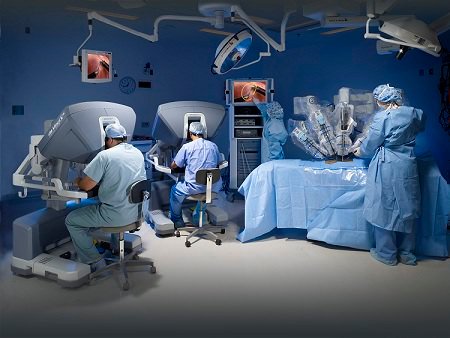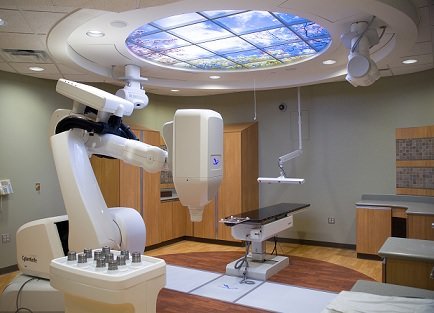Introduction
It is a very known fact that the technology of Artificial Intelligence (AI) has found expression even in the field of medicine. Though these medical AIs are still in their infancy, but with the trend of technological advancements, we could get to a point in history where they would out-perform human doctors. Let us take a survey of the already existing medical AIs and the awesome possibilities embedded in them; which would enable us make extrapolations into what the future of AI in medicine would be. I welcome us once again to the future.
Da Vinci Robotic Surgical System
This was one of the earliest designed fully functional Robotic-assisted surgical system (designed by intuitive surgical inc.) and approved by the FDA in the year 2000. One of the purposes of creating this surgical system was because of the need for a minimal invasive surgery. And Da Vinci came on the scene.

[Image Source: Wikimedia Commons. Author: Intuitive Surgical, Inc. Description: Da Vinci action]
The surgical system as seen above, has flexible robotic arms equipped with high definition camera and other operative tools, which, when a tiny incision is made, would be guided through the incision by a surgeon using a console, which would also be monitored remotely from a screen. And up till date, according to a report from the official webpage of Da Vinci, it has performed over 3 million minimal invasive surgeries worldwide.
This was actually a major boost in the field of Ai in medicine. But, as it were, the Da Vinci surgical system is not fully autonomous, as the human surgeons still have to control the actions of the ams through a console. But this opened up the world to the possibility of actually having complex autonomous AI in medicine.
No wonder Dr Bertalan Mesko (medical futurist) made this comment:
Artificial Intelligence (AI) is the 21st century stethoscope. - Bertalan Mesko. Source.
Though humans have had reservations with AI being used in health care delivery, and also the fear of takeover of AI from human doctors has been brewing in the minds of many. But just like it has been said, these AIs are meant to compliment human doctors, not replacing them. But would they really stick to plan? Would robots edge-out human doctors?
Let us look at Robotic Dr Xiaoyi
Robotic Dr Xiaoyi
This robot was popularized in the later part of the year 2017, when it was seen to beat human doctors at the Chinese Medical Licensing Examination with a whopping 456 points (edging-out humans by 96 points). Does this give you any idea of how the future of medicine would look like? Well, just keep reading.
In September, it was reported that this particular AI performed the first truly recognized autonomous dental surgery on a patient; in which two sets of 3D-printed teeth were surgically implanted into the mouth of the patient. Did I tell you that it was done without input from human physicians? Yes! Apart from positioning the AI, it was fully autonomous. This looks like we are getting to a point in history where robotic doctors would be compared; in practice and abilities; to human doctors.

[Image Source: Wikimedia Commons. Author: Communications Manager. Image Description: Robotic Cyberknife]
Human doctors Vs Robo-doctor
Maybe the comparison has already started. A particular research was heralded at the Harvard University, which saw to the creation of the "Smart Microscope"
The "smart Microscope" is a very powerful AI medical diagnostic tool, which has been proven to detect blood infections which are potentially lethal.
More fascinating is the fact that this AI has a neural network which enables it to learn though experiences, just like the human doctors.
During the training of the AI, 100,000images of bacteria were incorporated into its neural links. Which has enabled it to distinguish; with over 95% accuracy level; various potentially lethal microorganisms.
Just as the world was about to recover from this spectacle, japan launched a Cancer-detecting AI which is able to detect cancer (especially colon cancer), even at the unset in real-time. Also, the training process comprised of using over 30 thousand highly magnified images of colo-rectal cancer as instructional materials.
That's not all. have you ever heard of Eve the medical AI? Actually, this AI inspired the invention of anti-malaria for drug-resistant malaria, through the use of "Triclosan" (a particular compound found in toothpaste).
Now we're beginning to see that the possibility of an AI take-over; even in medicine; is almost imminent. But you may ask, "who would be pegged when robots malpractice?"

[Image Source: Pixabay]
Suing a robot for medical malpractice?
Now this question is sounding like a tale from "neverland". But actually, people have this reservations about coming under "robotic knives".
In the case of "malpractice", the term is generally considered a resultant effect of negligence on the part of the physician, or maybe the contravention of a pre-defined operative standard.
That means, the event of negligence is linked to awareness. And we know that these medical robots do not incorporate "awareness" yet, and they also have pre-programmed standards. So in the event of complications arising from robotic practice, who goes down for it; the robot, the human physician overseer, or the creator of the robot? This, as it were, has no direct answer, but future will tell.
Conclusion
The role of AI in the field of medical science has been gaining widespread attention lately with the invention of medical robotics. there is no doubt that the future would see more of these robotics, and even more advanced ones. But the question is:
Would these medical AI be guided also by the "hippocrates oath" just like the human doctors? Also, will they be favoured over human doctors. - @samminator
Like I said before; future will tell.
Thanks for reading
References for further reading: Ref1, Ref2, Ref3, Ref4, Ref5
All Images are CC licensed and linked to their sources


gif by @foundation
Being A SteemStem Member
Downvoting a post can decrease pending rewards and make it less visible. Common reasons:
Submit
Thanks bot :p
Downvoting a post can decrease pending rewards and make it less visible. Common reasons:
Submit
great awareness.... thanks.
It is well understood that Artificial Intelligence will take over virtual everything the human does presently, even teaching.
Downvoting a post can decrease pending rewards and make it less visible. Common reasons:
Submit
Well, maybe future will tell :)
Downvoting a post can decrease pending rewards and make it less visible. Common reasons:
Submit
Hmmm
I wonder where you keep finding these things
First it was transferring consciousness, now robotic doctors... Okay o
I sha stick with being human
Good research
Downvoting a post can decrease pending rewards and make it less visible. Common reasons:
Submit
Lol. U don see am naa. Wetin man go do naa? :)
Downvoting a post can decrease pending rewards and make it less visible. Common reasons:
Submit
Personally I like anything robotics... But I think I'll feel safer if my doctor were a living being like myself
Downvoting a post can decrease pending rewards and make it less visible. Common reasons:
Submit
Lol. Same reservations that some people are having too
Downvoting a post can decrease pending rewards and make it less visible. Common reasons:
Submit
Nice one
Downvoting a post can decrease pending rewards and make it less visible. Common reasons:
Submit
Thanks
Downvoting a post can decrease pending rewards and make it less visible. Common reasons:
Submit